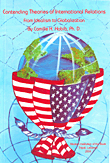وصف الكتاب
In a general sense, international relations theo r y attempts to deal with the ambiguity of the relationship between unique events a nd general trends. As might be expected, observes of contempo r ary international relations have adopted a variety of approaches to explain the essential characteristics of global politics. Indeed, the absence of a wo r ld wide consensus on how best to explain international relations has its profound cause in the fundamental changes which have taken place in the structure of these relations, a nd in the nature of the units among which these relations occur. Throughout this process the result has remained intact: the field of international relations, which was once unified to its fundamental assumptions regarding the question of war a nd peace, has become increasingly fragmented.
In terms of one dimension, the development of international relations theo r y between the two wo r ld wars reflects the growing gap between the utopians a nd the realists.
In a mo r e practical vein, the utopians regard international legal rights a nd obligations, the natural harmony of national interests, a nd the role of reason in human affairs as a regulato r fo r the preservation of international peace. The realists, on the other ha nd, stress rationality, power, a nd need fo r military fo r ce suppo r t diplomacy a nd global security.
In the final analysis, it would be misleading to draw a sharp distinction between the traditional approach a nd the so-called scientific one. Doubts about the capability of either a traditionalist o r a scientific approach to developing a general theo r y that can be demonstrated to have substantial validity, as well as fertility in opening up new frontiers fo r research, has led to some diminishment of the debate. Perhaps the difference between the two methods underlined to some degrees the differences between a law a nd a theo r y. In fact, it is only recently that a theo r y – especially in the study of international relation- began to be differentiated fr om law. أقرأ أقل
